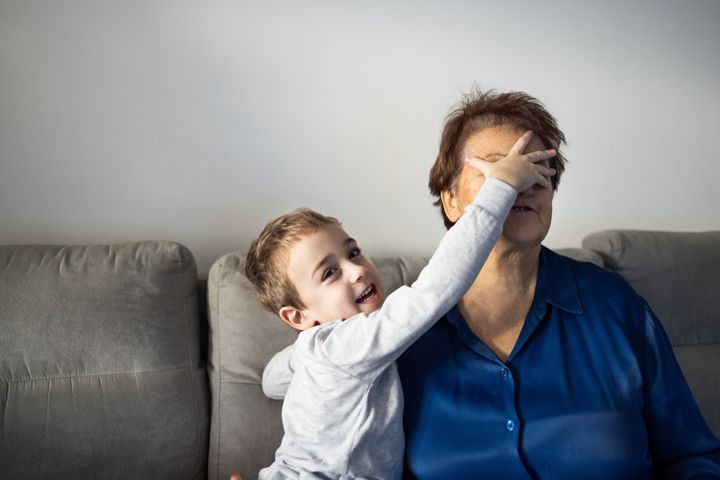News
Your Parents May Have A Case Of ‘Gramnesia.’ Here’s What The Viral Term Means.
Folks on the internet are constantly making up new terms — some pointless, others more useful. But this one is ringing true for many parents of young children.
“Gramnesia” is a portmanteau combining the words “grandparent” and “amnesia.” It’s unclear who first coined the term, but it has been appearing on online forums for years.
Maryland therapist and mom Allie McQuaid, who goes by @millennialmomtherapist on Instagram, posted a video in June on this topic with overlaid text that reads: “I just heard this term called ‘gramnesia’ when grandparents forget what it’s really like having young kids and I can’t stop thinking about how accurate it is.”
It has since racked up more than 4.4 million views, 20,000+ likes and hundreds of comments.
In the caption, McQuaid says that she’s heard a ton of stories from her clients— many of whom are millennials — about the “ridiculous” and unhelpful comments they’ve gotten from their own parents after they’ve spent time with the grandkids.
Common examples of gramnesia might include:
- “Oh, you slept through the night as soon as we brought you home from the hospital!”
- “You were potty trained at 1 — and it only took a weekend!”
- “You never had tantrums like this!”
- “We gave you rice cereal and you slept like a champ. Have you tried that?”
- “You were never this picky. You always ate whatever we put on your plate.”
McQuaid has several theories about what might be causing this wave of gramnesia. For one, it’s natural to have a “foggier memory of how things truly were” as we get older, “especially if the experience we had was particularly difficult or even traumatic,” she said. There’s even a psychological phenomenon known as “euphoric recall,” which says we have a tendency to remember past experiences, especially negative ones, more positively than they actually were at the time.
Plus, the recommendations for raising kids have evolved over time as new research and best practices have emerged. So advice a pediatrician may have given to a parent in the 1980s or ’90s may not be advisable today.
Another factor may be that in older generations, parents — and moms in particular — weren’t given the same space to talk about the struggles of adjusting to life as a parent and raising kids, McQuaid said.
Today there’s less stigma for mothers to “speak out about the realities of motherhood,” she said.
Parents report feeling frustrated and invalidated by these kinds of offhand gramnesia remarks, McQuaid said. But if they voice their frustrations, they worry it will feed into negative stereotypes many folks have of millennial parents, McQuaid said, that they’re entitled, spoiled or complainers.
“It makes these parents feel like they can’t share their struggles or emotions with their parents — the grandparents — or have difficulty setting boundaries with them,” she added.
In a follow-up Instagram Reel, McQuaid explained that the main reason these comments are unhelpful is that they don’t change the things parents of young kids are struggling with and they minimize the very real stress they’re facing.
“Our boomer parents telling us that we didn’t cry ever (whether that’s true or not is up for debate apparently..) doesn’t change the fact that OUR baby now is crying and needs our care,” McQuaid wrote.
“Maybe all you can do is smile and nod after hearing for the 100th time how ‘you were never like this.’”
– Allie McQuaid, therapist
When dealing with these kinds of comments, it’s up to you whether to address them or simply ignore them.
“Check your capacity if you have the space or energy to even consider bringing up your frustration with your parents,” McQuaid said. “You are likely in the throes of parenting right now, and maybe all you can do is smile and nod after hearing for the 100th time how ‘you were never like this.’”
If you do want to speak up and say you were hurt or irked by a gramnesia remark, “revisit in a way that makes sense to you and your relationship with your parents,” McQuaid said. That might mean a text or a phone call or bringing it up the next time you’re together.
She suggested saying something along these lines: “When you said that Harper always acts up at restaurants and I never did when I was her age, it makes me question how well I’m doing as a parent.”
Support Free Journalism
Already contributed? Log in to hide these messages.
And if you don’t want to bring this up with your parents directly, that’s fine, too. You can also discuss it with your partner, a friend, your therapist or a fellow parent in the trenches on the internet instead, McQuaid said.
If you’re the grandparent in this situation, one of the most helpful things you can say to your adult child is: “We must have forgotten what it was like to be a new parent,” McQuaid said. “You are doing a great job, and it gets so much better that you might forget how hard it was at that time.”
Support Free Journalism
Already contributed? Log in to hide these messages.

